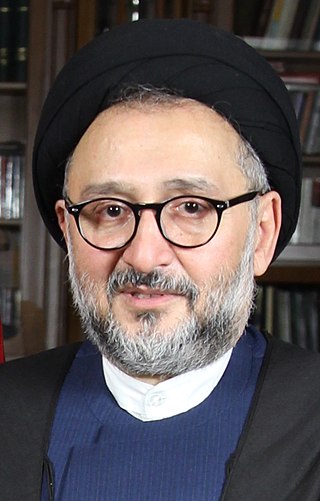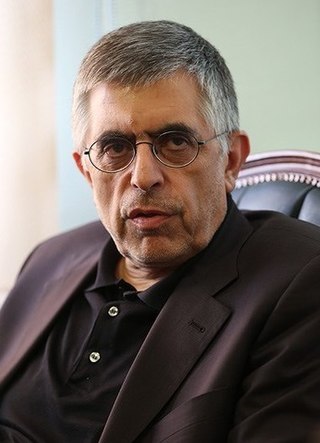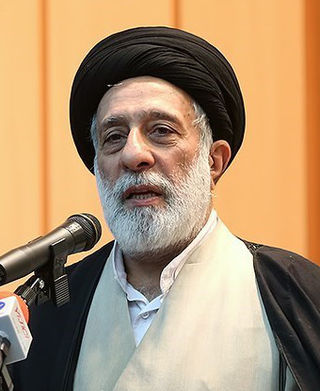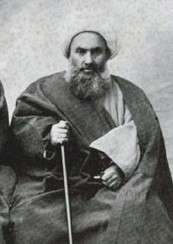
Muhammad Khatami is an Iranian reformist politician who served as the fifth president of Iran from 3 August 1997 to 3 August 2005. He also served as Iran's Minister of Culture from 1982 to 1992. Later, he was critical of the government of subsequent President Mahmoud Ahmadinejad.

Seyed Mohammad-Ali Abtahi is an intellectual clergy; a politician who is also active in arts and cultural areas on social media; An Iranian blogger, who is currently working as the president of the international institute of Religions' Dialogue and finally a member of Founders’ council and Central Council of Combatant Clergy Association.

The Reformists are a political faction in Iran. Iran's "reform era" is sometimes said to have lasted from 1997 to 2005—the length of President Mohammad Khatami's two terms in office. The Council for Coordinating the Reforms Front is the main umbrella organization and coalition within the movement; however, there are reformist groups not aligned with the council, such as the Reformists Front.
A hawza or ḥawzah ʿilmīyah is the collective term for madrasa where Shi'a Muslim scholars are educated.

Presidential elections were held in Iran 17 June 2005, with a second round run-off on 24 June. Mohammad Khatami, the previous president of Iran, stepped down on 2 August 2005, after serving his maximum two consecutive four-year terms according to the Islamic republic's constitution. The election led to the victory of Mahmoud Ahmadinejad, the hardline mayor of Tehran, with 19.48% of the votes in the first round and 61.69% in the second. Factors thought to have contributed to Ahmadinejad's victory include mobilization of mosque networks and conservative/hardline voters, and a protest vote against corrupt elite insiders and for "new political blood". A loyal supporter of conservative Supreme Leader Khamenei, Ahmadinejad kissed the leader's hand during his authorization ceremony. Officials reported a turnout of about 59% of Iran's 47 million eligible voters, a decline from the 63% turnout reported in the first round of balloting a week before.

Abdollah Noori is an Iranian cleric and reformist politician. Despite his "long history of service to the Islamic Republic," he became the most senior Islamic politician to be sentenced to prison since the Iranian Revolution, when he was sentenced to five years in prison for political and religious dissent in 1999. He has been called the "bête noire" of Islamic conservatives in Iran.
Special Clerical Court, or Special Court for Clerics is a special Iranian judicial system for prosecuting crimes, both ordinary and political, committed by Islamic clerics and scholars. The Special Clerical Court can defrock and disbar Islamic jurists, give sentences of imprisonment, corporal punishment, execution, etc. The court functions independently of the regular Iranian judicial framework, with its own security and prison systems, "generally secret and confidential" cases, proceedings and procedures, and is accountable only to the Supreme Leader of Iran,. The most senior Islamic politician to be prosecuted and sentenced to prison since the Iranian Revolution was Abdollah Nouri who was sentenced to five years in prison for political and religious dissent by the court in 1999.

Mohammad Reyshahri, also known as Mohammad Mohammadi-Nik, was an Iranian politician and cleric who was the first Minister of Intelligence, serving from 1984 to 1989 in the cabinet of Prime Minister Mir-Hossein Mousavi.

Muhammad Taqi Misbah YazdiGiwachi was an Iranian Shia scholar, political theorist and philosopher who served as the spiritual leader of the Front of Islamic Revolution Stability.

Gholamhossein Karbaschi is an Iranian politician and former Shia cleric who was the Mayor of Tehran from 1990 until 1998. He is considered politically reformist and is a close ally of former president Mohammad Khatami. He was arrested, tried convicted and imprisoned on corruption charges in what the New York Times claimed "was widely seen among moderates as a politically motivated attack" by the government's conservatives and hard-liners to thwart President Mohammad Khatami's reformist agenda. He was the General Secretary of Executives of Construction Party until 2021.

Sayyid Hadi Khamenei is an Iranian reformist politician, mujtahid and linguist. He is a key member of the reformist Association of Combatant Clerics, and a former deputy of the Majlis of Iran representing a district in Tehran.

Grand Ayatollah Yousef Saanei was an Iranian Twelver Shi'a Marja' and politician, a member of the Islamic Republic of Iran's powerful Guardian Council from 1980 to 1983 and also Attorney-General of Iran from 1983 to 1985.

The Shrine of Fatima Masumeh is located in Qom, which is considered by Twelver Shia Muslims to be the second most sacred city in Iran after Mashhad.

Grand Ayatollah Sheikh Hossein Wahid Khorasani is an Iranian author and Shia marja'.

Islamic fundamentalism in Iran is the practice of Islamic fundamentalism in the nation of Iran. In the 21st century, "fundamentalist" in the Islamic Republic of Iran generally refers to the political faction known as the "Principlists", or Osoulgarayan, as in acting politically based on principles of the Islamic Revolution. which is an umbrella for a variety of conservative circles and parties and dominates politics in that country. The Supreme Leader and the president are principalists, and principalists have control of the Assembly of Experts, the Guardian Council, the Expediency Discernment Council, and the Judiciary. The term contrasts with "reformist" or Eslaah-Talabaan, who seek religious and constitutional reforms.

Islamic Clericalism in Iran has a long history and had a remarkable impact on Iranian society, politics as well as on Islamic theology.

Mir-Hossein Mousavi Khameneh served as the last Prime Minister of Iran, from 1981 to 1989, before the position was abolished in the 1989 review of the Iranian constitution. In the years leading up to the Islamic Revolution, Mousavi and his wife, Zahra Rahnavard, moved to the United States; they returned to Iran shortly after the establishment of the Islamic Republic.
Grand Ayatollah Ahmad Azari-Qomi-Bigdeli was an Iranian cleric. Born in 1925 in Qom, after the 1979 Iranian Revolution he served on the Special Clerical Court, and Assembly of Experts, founded the conservative Resalat Newspaper. He was arrested in November 1997 after an open letter by him was published in Britain criticizing Supreme Leader Ali Khamenei for allowing torture and "moral corruption" among officials and clerics. Shortly after Khamenei denounced him in a televised speech for allegedly committing "treason against the people, the revolution and the country." His renewed candidacy for the Assembly of Experts was rejected by the Guardian Council the next year and he died in 1999.

The Najaf Seminary, also known as the al-Hawza Al-Ilmiyya, is the oldest and one of the most important Shia seminaries (hawza) in the world. It is located near the Imam Ali Mosque in the city of Najaf in Iraq, and also operates a campus in Karbala, Iraq. It was established by Shaykh al-Tusi, and continued as a center of study after the establishment of modern Iraq in 1921.

Seyyed Mohammad Saeedi is an Iranian Twelver Shia cleric, who is the trustee of the Fatima Masumeh Shrine, and Qom Imam of Friday Prayer. He is also the representative of Guardianship of the Islamic Jurist of Qom.